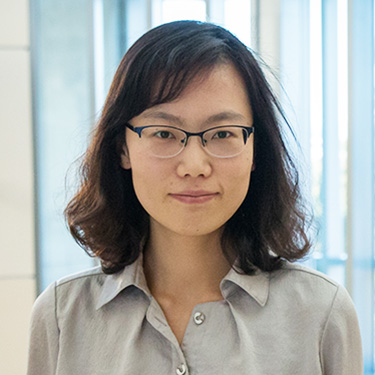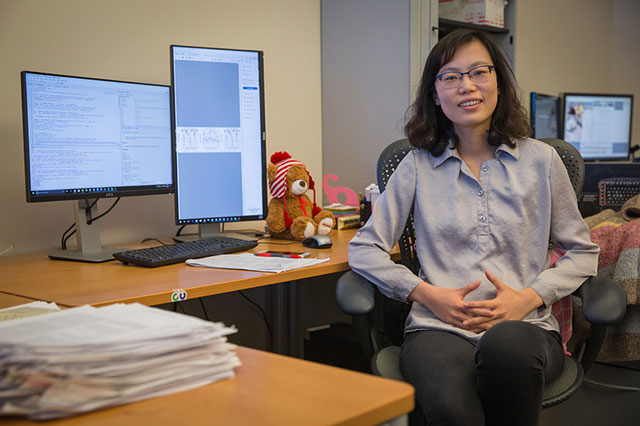
Each year the research division of Microsoft awards Ph.D. fellowships to a handful of particularly deserving graduate students, and the competition is intense. Today Microsoft tapped University of California San Diego student Mengting Wan to receive the two-year fellowship that will cover all her costs for tuition, travel, and living expenses that will take Wan through to completing her Ph.D. in Computer Science, expected in 2019.
[Editor's Note: Of the 10 newly-appointed fellows nationwide, two of the awards went to UC San Diego students. In addition to CSE’s Wan, ECE second-year Ph.D. student Bita Darvish Rouhani also received a Microsoft Ph.D. Fellowship to pursue her work in computer architecture and hardware. No other university received more than a single Ph.D. fellowship from Microsoft Research this year.]

Wan works in data mining, machine learning and computational social science, and her advisor is Computer Science and Engineering (CSE) professor Julian McAuley. “"The balance between mathematical rigor and real-world applications is the greatest strength of Mengting’s research,” explained McAuley, who leads the Artificial Intelligence Group. “Her combination of strengths and interests allows her to combine models from economics, machine learning and natural-language processing, while bringing a unique perspective to explain the relationship between problems that would never have occurred to me before collaborating with her."
Specifically, says Wan, she will use the fellowship from Microsoft to continue developing “interpretable, scalable and predictive approaches to model human opinions and behavior from structured and unstructured data.” She builds scalable, machine-learning algorithms to process massive (and heterogeneous) real-world human activity datasets, and applies it to areas including e-commerce, recommender systems (e.g., Amazon’s success in recommending future purchases based on the consumer’s previous orders on Amazon), and opinion-oriented question answering (QA) systems.
Wan models opinions and behavior in the context of two major problems. One involves “learning ‘macro-knowledge’ from ‘micro-opinions/behavior’, which aims to effectively organize and summarize both factual knowledge and subjective opinions,” she explained. “But I also want to leverage ‘macro-knowledge’ to interpret and predict ‘micro-opinions/behavior’.” To do so, Wan added, she is studying the connection between efficient recommendation engines and established behavioral theories in social sciences.

recipients among 10 nationwide of Microsoft Ph.D.
Fellowships for 2017.
Mengting Wan is a second-year Ph.D. student in CSE, which she joined after completing her M.S. in Statistics at the University of Illinois at Urbana-Champaign in 2015. She did her undergraduate degree at Peking University, also in Statistics (receiving her B.S. in 2013).
Last summer she did an internship at the Microsoft Research facility in Redmond, WA, which may have been helpful in reinforcing her nomination for the Ph.D. fellowship.
Wan could also point to a joint paper* with her Ph.D. advisor, Julian McAuley, when she received a student travel award from the 2016 IEEE International Conference on Data Mining (ICDM) so she could present the paper in person at the ICDM meeting in Barcelona in December. She co-authored the paper on “Modeling Ambiguity, Subjectivity and Diverging Viewpoints in Opinion Question Answering Systems” with her advisor, Julian McAuley. (The paper on opinion QA systems is in contrast to the less complex task of determining the best response to a question about objective information that can be answered by constructing and exploring a factual knowledge-base). Wan and McAuley based their research on QA data from Amazon in the form of over 800,000 questions and 3,000,000 answers in eight large categories that were either “binary” or “open-ended”.
Wan is also the first author on a broad study** of “Modeling Consumer Preferences and Price Sensitivities from Large-Scale Grocery Shopping Transaction Logs.” She is headed for Perth, Australia, in April to present the paper at the 2017 International World Wide Web Conference (WWW 2017). In the paper, Wan, McAuley and their co-authors will propose a nested feature-based matrix factorization framework to model consumers’ purchase decisions from large-scale grocery shopping transaction logs.
Last year Wan received a second student travel award to present a paper at ACM Special Interest Group Conference on Knowledge Discovery and Data Mining (SIGKDD 2016) in San Francisco. It was based on her Master’s research at the University of Illinois with co-authors Xiangyu Chen, Lance Kaplan, Jiawei Han, Jing Gao and Bo Zhao – but published after Wan had left Urbana-Champaign for San Diego. The paper was titled, “From Truth Discovery to Trustworthy Opinion Discovery: An Uncertainty-Aware Quantitative Modeling Approach” (August 2016).
*Mengting Wan, Julian McAuley, “Modeling Ambiguity, Subjectivity, and Diverging Viewpoints in OpinionQuestion Answering Systems”, Proc., 2016 IEEE International Conference on Data Mining (ICDM 2016), Barcelona, Spain, December 2016
**Mengting Wan, Di Wang, Matt Goldman, Matt Taddy, Justin Rao, Jie Liu, Dimitrios Lymeropoulos, and Julian McAuley, “Modeling Consumer Preferences and Price Sensivities from Large-Scale Grocery Shopping Transaction Logs,” Proc. 2017 International World Wide Web Conference (WWW 2017), Perth Australia
Related Links
Mengting Wan Website
Microsoft Ph.D. Fellowship 2017 Announcement
Full ICDM 2016 Paper

